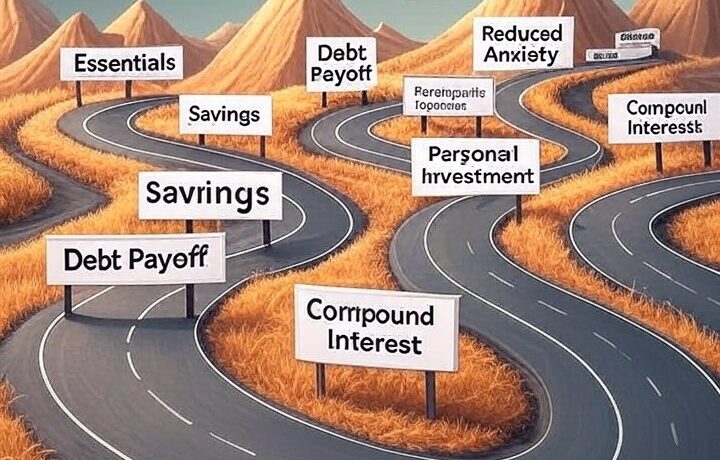Budget Like a Pro: Tips on Personal Budgeting and Managing Cash Flow
Let’s be honest—budgeting doesn’t sound like the most exciting thing in the world. But if you’ve ever felt stressed when checking your bank balance, or wondered where your paycheck disappeared to, it might be time to get serious about personal budgeting.
The good news? Budgeting isn’t about restriction—it’s about freedom. Freedom to spend without guilt, to save without panic, and to finally feel in control of your money. Whether you’re living paycheck to paycheck or just looking to fine-tune your finances, these personal budgeting tips can help you take the reins.

What Is Personal Budgeting and Why Should You Care?
Personal budgeting is the process of creating a plan for how you’ll spend and save your money. It helps you make smart choices, avoid debt, and prepare for the future—even if you’re not earning six figures.
Think of it as a roadmap. Without one, it’s easy to get lost. With a solid budget, you can:
- Cover your essentials without worry
- Build savings for emergencies or big goals
- Pay off debt faster
- Feel less anxious about money
Step 1: Track Your Income and Expenses
You can’t fix what you can’t see. Start by tracking every dollar for one full month.
Here’s what to look at:
- Income: Your salary, freelance gigs, side hustles—everything.
- Fixed expenses: Rent, mortgage, car payments, insurance.
- Variable expenses: Food, gas, entertainment, shopping.
- Irregular costs: Gifts, annual fees, vacations, car maintenance.
Use a spreadsheet, app (like Mint or YNAB), or even a pen and paper. Just be honest—it’s not about judgment; it’s about clarity.
Step 2: Build a Realistic Budget That Works for You
Not every budget fits every lifestyle. Forget perfection. Focus on creating a plan that supports your real needs and habits.
A common starting point is the 50/30/20 rule:
- 50% for needs: rent, groceries, utilities
- 30% for wants: dining out, subscriptions, travel
- 20% for savings and debt: emergency fund, loan payments, retirement
If your situation is tight, adjust the percentages. Prioritize essentials and saving something—even if it’s just $10 a week.
Step 3: Automate Your Cash Flow
Make your budget easier to stick to by putting things on autopilot:
- Set up automatic bill payments to avoid late fees
- Schedule transfers to savings right after payday
- Use separate accounts for spending and saving
Automation reduces the risk of “accidental spending” and helps you stay consistent with your personal budgeting goals.
Step 4: Cut Back Without Feeling Deprived
Nobody wants to live like a monk. Budgeting isn’t about saying “no” to everything fun—it’s about choosing where your money goes.
Try these easy swaps:
- Cook at home 3 nights a week instead of takeout
- Cancel subscriptions you forgot you had
- Switch to a lower-cost phone or internet plan
- Buy secondhand or wait 24 hours before impulse purchases
Even small changes can free up hundreds over a few months.
Step 5: Check In and Adjust Regularly
Life happens. Expenses change. So should your budget.
Set a calendar reminder once a month to:
- Review what you spent
- See what worked and what didn’t
- Make changes if needed
It’s not failure if you adjust—it’s smart. Think of your budget as a living document that evolves with your life.
Bonus: Build an Emergency Fund (Even a Small One)
An emergency fund is your financial safety net. Aim for $500 to start, then work toward 3–6 months of expenses.
Why it matters:
- Covers unexpected costs like car repairs or medical bills
- Keeps you from going into debt
- Gives you peace of mind
Even $20 a week adds up. Keep it in a separate savings account so it’s not too easy to dip into.
Final Thoughts: Small Steps = Big Wins in Personal Budgeting
You don’t need to be a finance whiz to succeed at personal budgeting. You just need a plan, a bit of discipline, and the willingness to start. The more you understand your money, the more control you gain—not just over your bank account, but over your entire life.
So, grab a notebook or download a budgeting app. Start simple. Be patient. Your future self will thank you.
Want More Help?
If you’re ready to level up your personal budgeting game, consider chatting with a financial coach or advisor. A little guidance can go a long way.
Managing money can feel overwhelming, especially for small business owners and individuals juggling expenses, savings, and investments. But with the right personal wealth management, you can take control of your finances and build long-term security. Already savvy with investing, you can learn about diversified portfolio here. You can learn more about 401k here and Index Funds here.




